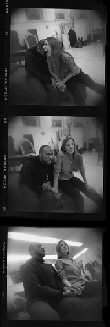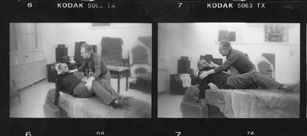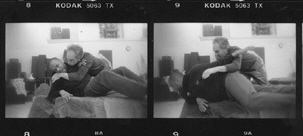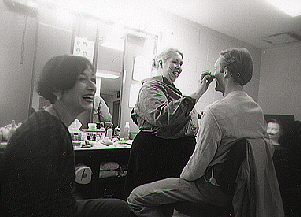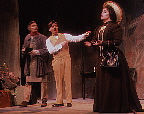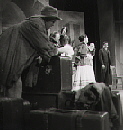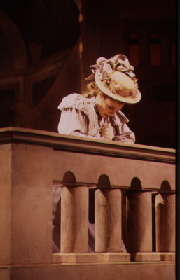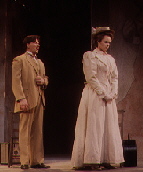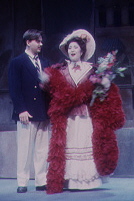
|
|
Philip (Taylor Armstrong) greets the
prima donna (Jae Eun Shin).
|
|
As they got deep into the production, Brunyate expressed regret
that he and Weiser hadn't taken a few more chances and written
something edgier, more modern. His narrative and staging are
mostly straightforward and realistic, and Weiser's score, though
it has its dissonant moments, is achingly beautiful and lyrical
in ways that have gone out of fashion with composers, though not
with audiences. But it's precisely this cut against the grain
that elevates Weiser's accomplishment. He has explored the
boundary between the melodic lushness of the 19th and early 20th
centuries and the dissonance of the last 50 years, and forged
something that seduces the heart but never stops surprising the
mind.
Weiser smiles a bit ruefully and says, "As a 20th-century
composer, you worry when you hear people say, 'It's so lyrical.'
But that didn't bother me with this project. What do I have to
prove?"
During one of the final rehearsals, Weiser's wife, Elizabeth, sat
beside him holding his hand. At the end of Caroline's beautiful
aria, she brought his hand to her lips and kissed it. Later in
the evening, Brunyate leaned over to Weiser, squeezed his
shoulder, and said, "This is the real thing."
Act 2, Scene 2
Opera within opera: Philip, Harriet, and Caroline attend a
village performance of Donizetti's Lucia di Lammermore.
During the lead-in music, the cast backstage sings sections of
the Donizetti, including a bit of Lucia's mad scene in which the
coloratura must hit an E-flat above high C.
This has been one of those moments that everyone stopped to
listen for in rehearsal. During one of the first run-throughs
with the orchestra, Katherine Unha Keem, one of Angels'
two Korean prima donnas, commenced her race up the scale. When
she nailed the E-flat, both casts and the entire orchestra
stopped to applaud. Tonight, Jae Eun Shin has the part, and she
hits the note as well.
This scene has some Weiser fireworks to match Donizetti's. After
the performance of Lucia, Philip runs into Gino and a
couple of his drunken buddies. Gino greets him as a long-lost
brother, and insists they must celebrate. The four men end the
act with a thrilling quartet: The night is young/The stars are
bright/And there's magic in the air! It is the opera's most
joyous moment. For months of rehearsal, the singers and directors
had heard this section only in the Peabody opera studio with
piano accompaniment. Not until two weeks before the first
performance did they hear the quartet with a full orchestra. The
four men had been facing the orchestra so the players could hear
them, but for the climax they turned toward the rehearsal
audience, which was mostly other cast members and a few
observers. The crescendo built, the singers cut loose, the
orchestra resounded, and at the end everyone in the hall whooped
and applauded. Sirota turned on his podium, peered into the
audience until he found Weiser, and said: "Make a note--that
works."
Act 2, Scene 3
The next morning, Caroline sneaks off to Gino's house. She is
convinced that the Herritons don't really want the child, and she
intends to negotiate on her own for the baby. Gino is not home;
the housekeeper lets her in. Caroline sings an aria that explores
her complex feelings for Gino, then hides in the shadows when he
comes home. Not knowing she is there, he flings off his shirt,
which nearly hits her. Gino hears her startled yelp, leads her to
a chair, then announces that he is about to remarry. Caroline
erupts at the news, telling him he cannot ruin another woman as
he ruined Lilia. The moment echoes the first act, when Philip
unwittingly forbids the already consummated marriage to Lilia. It
is one of the structural unities Brunyate has smartly written
into his libretto.
Weeks before, rehearsal of this scene had dramatically
illuminated the character of Gino. Arturo Chacón, playing
the Italian, was rehearsing with Anne Jennifer Nash singing
Caroline. Brunyate was working out the blocking for the scene,
and Nash suggested that she cross in front of Chacón
toward a shrine Gino has kept in memory of Lilia. Brunyate didn't
like the idea, but he's open to suggestions and he let them try
it. Chacón and Nash ran the scene, and when she walked
past him, he suddenly grabbed her arm and violently whirled her
around. In a flash, Brunyate understood something about Gino he'd
never seen before: how his violence, which had not been scripted
to emerge until provoked in the third act, is ever present
beneath his surface amiability. His tenderness emerges only in
the aftermath of a violent act. In one improvisatory moment,
Chacón and Nash had revealed new depths to Gino's
character.
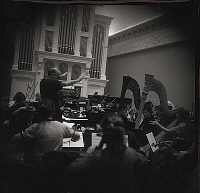 |
| Sirota conducts a
rehearsal. |
Late in the scene, Caroline and Gino bathe the infant, an
affecting moment that convinces Caroline she and the Herritons
must not take the baby from him. The audience cannot see the
conductor's face, but at an earlier rehearsal of this scene,
Sirota had turned from the podium with tears in his eyes, his
voice cracking with emotion as he said, "I have to get used to
that part. After all, I have to be able to conduct."
Act 3, Scene 1
A few days before the first curtain, Sirota had described
conducting Angels as "landing a 747...for two hours." The
orchestra players are young, many of them 18 or 19 years old.
"They're puppies," Sirota says. They received Weiser's score
about a month before performance, and Sirota patiently (now and
then impatiently, when they failed to concentrate) guided them
through its complexities, exacting the best from them with a
bluntness softened by humor. During one rehearsal the violins
kept botching a passage. Sirota stopped and asked them for the
key. They responded B-flat major. He pointed out that what they
kept flubbing was really no more than a B- flat scale. They all
knew how to play scales, and more important, they knew
that they knew how. With confidence inspired by Sirota's simple
explanation, they played the passage perfectly. Later, he stopped
them again, at another problem: "This is a mistake that the first
violins have made three times now. Make new mistakes."
Rehearsing the singers, he was always after more colors, a
greater range of expression. They were naturally resistant;
singers want to make beautiful music all the time. But Sirota
didn't want everything beautiful. "Boring," he told them. "You
sit there in the audience and say, 'Gee, that was pretty.' And
you get nothing else out of it. I will give you other
opportunities to tear up the scenery, I promise you."
The first scene of the final act takes place in a church, Santa
Deodata. It is a subtle and complex interlude in which Philip and
Caroline hesitantly work toward expressing the strong emotions
they're beginning to feel. For Philip, in particular, this is a
pivotal scene. He must express his awakening feelings for
Caroline and simultaneously convey that he doesn't quite know
what to make of the unexpected force of his emotions. The arousal
of passion collides with his English conventionality and
reserve.
From early on, Philip has been a sticking point for Brunyate and
Weiser. Their collaboration has been fruitful but not devoid of
tension. They could not agree on Philip. Says Weiser, "The more I
worked on the opera, the more I was rooting for Caroline and
Philip to get together, and I wanted the audience to root for
them, too. Roger feels very strongly that Philip is a latent
homosexual. That's a possibility, but I don't think that's what
the book is about."
After Weiser read Brunyate's first libretto, he wrote a long
letter detailing this and other differences, and the project
nearly fell apart. The gap seemed irreconcilable. Weiser went to
Brunyate's house, they had a long discussion, and decided to
persevere, working out their differences. The story had too
strong a grip for them to walk away.
But they still had to decide what to do with Philip as an
operatic character. He is rarely an active agent, always doing
someone else's bidding and just trying to flow with the current.
He begins the play as something of an arrogant twit, and though
he's much more likable and admirable by the end, he pales next to
the vital, passionate Gino. Throughout rehearsals, Brunyate and
Weiser still differed over Philip, as did the tenors playing
him.
Duane Moody's portrayal was always broader and more passionate
than that of his counterpart, Taylor Armstrong. Moody, who does
not lack self-confidence, was determined from the start to put
more life in Philip: "I picture Philip as a mama's boy but not a
weakling. The directors wanted to make him more feeble in the
beginning. I just can't see Philip as that passive."
Armstrong, a 23-year-old Pennsylvanian, consistently acted the
part with more English reserve, except for the church scene and
its aria, which begins with Philip claiming that he does not fall
in love but acknowledging how deeply Caroline has moved him.
Armstrong sang the aria in rehearsal as an expression of passion,
clasping Caroline's hand and gazing into her eyes.
Late on a Friday afternoon a few weeks before opening night,
Brunyate decided to rework the scene. He instructed Moody, who
was rehearsing while Armstrong watched, to not touch Caroline but
turn away and sing his lyrics as if he's beginning to sense what
stirs within him but cannot bring himself to address her
directly. Weiser's score for Philip's aria is music of love, and
Brunyate wanted Moody to play against that: Philip would sing his
denial of love, his body language would betray his confusion, and
the music would tell the audience of the passion he doesn't yet
understand.
Armstrong and Nash, watching Moody and Laurie Flint play the
scene, exchanged a look of concern tinged with frustration.
Armstrong protested that all along he had believed that Philip
knows he loves Caroline but simply can't tell her. This new
staging would change all of that, and thus dramatically change
his portrayal of the character. Brunyate heard him out, then let
him and Nash try various movements, finding their own way through
the scene.
Tonight on the stage, Armstrong does indeed turn away from Nash.
She silently approaches him as he sings the aria, and when he
turns back to her, he is startled by her closeness. But they do
not touch. When Caroline leaves the church, Armstrong hesitates,
then runs after her, only to return alone, disconsolate that she
is gone. The scene now conveys the awkwardness that Brunyate was
after, and the audience sees the acknowledgment of passion that
Armstrong had desired. It's the fruit of creative
collaboration.
Act 3, Scene 2
In the darkness of a rainy, miserable night, Philip stands by a
carriage awaiting his sister. Harriet suddenly appears, and it is
only after they have climbed into the carriage that he realizes
Harriet has stolen Gino's child. They race for the train station
and their carriage collides with another that bears Caroline. In
the aftermath, Caroline finds Philip, who has broken his arm, and
hears from the dazed Harriet that the baby was with them but now
is lost. Frantic, Caroline searches for the child in the
wreckage.
 |
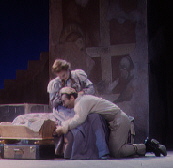 |
|
Gino erupts at the news of his
infant son's death (Moody, Brendan Cooke, and Laurie Flint, in
rehearsal). Then, spent, he collapses in sorrow (right).
|
Most of the singers in Angels are in their early or
mid-20s. Laurie Flint, one of the sopranos performing Caroline,
is not. She politely declines to state her age, but she is closer
to 40 than to 20 and has a 10-year-old daughter. Singing is her
second career. She had been working in hospital administration
when she had her child. Living in London at the time and coping
with post-partum depression, she began thinking about what she
would regret were her life to end suddenly. And she knew the
answer: She would regret never having pursued singing. She began
studying music again, and when Hopkins recruited her husband,
otolaryngologist Paul Flint, she set her sights on Peabody.
On stage, Caroline finds the baby amid the wreckage and realizes
that he is dead. She clutches the infant to her breast and
screams NOOOOO!!! with a depth of despair and anguish that sears
the audience. Flint had created this climax for the scene back in
January rehearsals. Watching her that day, one could understand
what emotional resources she might have drawn from to create such
a stunning moment. But how to account for young, childless
Jennifer Nash, who tonight plays the scene with the same profound
anguish? The explanation, for both sopranos, must be pure, raw
talent.
Act 3, Scene 3
Philip comes to Gino's house and reveals the awful truth of what
has happened. An enraged Gino wrestles him to the bed, torturing
him by wrenching his broken arm until Caroline rushes in and
halts the violence.
Arturo Chacón, a happy-go-lucky Costa Rican baritone,
stepped into the role of Gino as if it were a second skin. "Gino
is Latino in some ways," he explains, in accented English. "When
Gino say to Lilia, 'This is your home, with
me'...that is so Latino." Chacón has been a
favorite with his female castmates. In a 45-minute span during
one rehearsal, three of them found pretext to snuggle up and kiss
him. But it's frightening how menacing he can be when the part
demands it. When Caroline first pulls Gino off Philip, he whirls
around and violently tosses her onto the bed. During a rehearsal,
Nash, one of his closest friends in the cast, told him,
"Remember, Arturo, you are really strong."
For Brendan Cooke, a friendly Irish American who once wanted to
be a heavy-metal guitarist, Gino has not been the same sort of
easy role. He watches Chacón and says, "Gino comes
naturally to him. It's not natural to an Irish guy like me."
Chacón's every gesture says, This is my town, my house,
my woman. Cooke tends to move like what he is, a nice, gentle
man, and he struggled before getting a better grip on the role
days before the show opened. After weeks of listening to people
say, "Do it like Arturo's doing it," he finally got to hear,
"Arturo, why don't you try what Brendan's doing?"
Despite the difficulties--and a bout with pneumonia--Cooke
enjoyed the prominence of the role. "The baritone usually plays
the old drunk," he says. He also savored a bit of baritone's
revenge: "After we first rehearsed the scene where Gino torments
Philip, I called my old vocal teacher and said, 'I just spent two
hours smacking the crap out of the tenor. It was great.'"
|

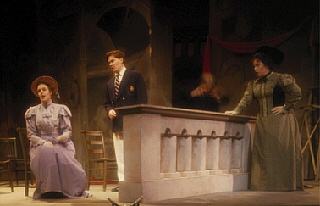
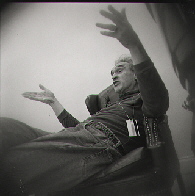 Brunyate (pictured at right) wrote the opera's libretto,
based on E.M. Forster's
novel of the same title, and he is also the stage director.
Weiser composed the score. Their work on the project began seven
years ago, and they were still burnishing the show on the eve of
this first performance. The singers won their roles last
September and commenced months of study, vocal coaching, and
rehearsal. They got sick, got well, went to class, skipped class,
auditioned for summer jobs, pondered upcoming recitals, juggled
rehearsal schedules for other productions, learned staging,
learned revised staging, and practiced day after day after day.
For weeks, Angels has been the nexus of their young
lives.
Brunyate (pictured at right) wrote the opera's libretto,
based on E.M. Forster's
novel of the same title, and he is also the stage director.
Weiser composed the score. Their work on the project began seven
years ago, and they were still burnishing the show on the eve of
this first performance. The singers won their roles last
September and commenced months of study, vocal coaching, and
rehearsal. They got sick, got well, went to class, skipped class,
auditioned for summer jobs, pondered upcoming recitals, juggled
rehearsal schedules for other productions, learned staging,
learned revised staging, and practiced day after day after day.
For weeks, Angels has been the nexus of their young
lives.